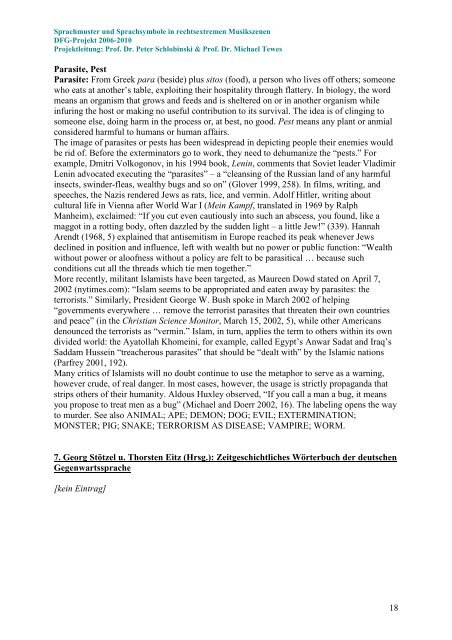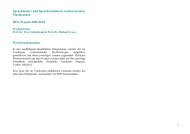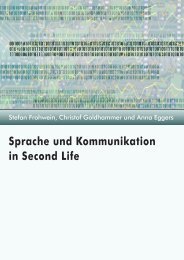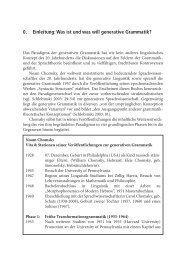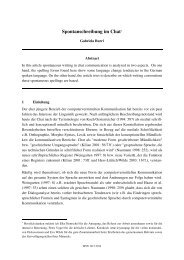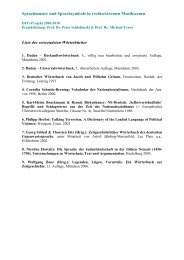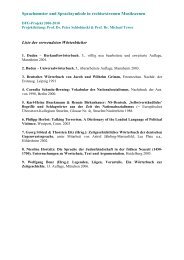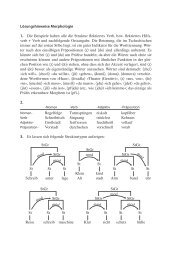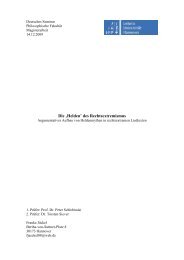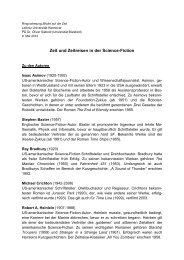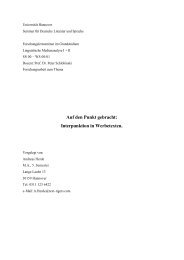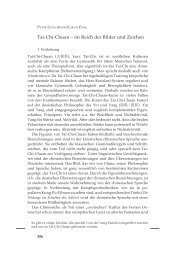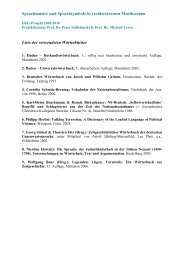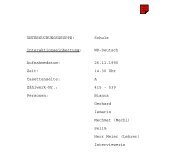Einträge P-R - mediensprache.net
Einträge P-R - mediensprache.net
Einträge P-R - mediensprache.net
Sie wollen auch ein ePaper? Erhöhen Sie die Reichweite Ihrer Titel.
YUMPU macht aus Druck-PDFs automatisch weboptimierte ePaper, die Google liebt.
Sprachmuster und Sprachsymbole in rechtsextremen Musikszenen<br />
DFG-Projekt 2006-2010<br />
Projektleitung: Prof. Dr. Peter Schlobinski & Prof. Dr. Michael Tewes<br />
Parasite, Pest<br />
Parasite: From Greek para (beside) plus sitos (food), a person who lives off others; someone<br />
who eats at another’s table, exploiting their hospitality through flattery. In biology, the word<br />
means an organism that grows and feeds and is sheltered on or in another organism while<br />
infuring the host or making no useful contribution to its survival. The idea is of clinging to<br />
someone else, doing harm in the process or, at best, no good. Pest means any plant or anmial<br />
considered harmful to humans or human affairs.<br />
The image of parasites or pests has been widespread in depicting people their enemies would<br />
be rid of. Before the exterminators go to work, they need to dehumanize the “pests.” For<br />
example, Dmitri Volkogonov, in his 1994 book, Lenin, comments that Soviet leader Vladimir<br />
Lenin advocated executing the “parasites” – a “cleansing of the Russian land of any harmful<br />
insects, swinder-fleas, wealthy bugs and so on” (Glover 1999, 258). In films, writing, and<br />
speeches, the Nazis rendered Jews as rats, lice, and vermin. Adolf Hitler, writing about<br />
cultural life in Vienna after World War I (Mein Kampf, translated in 1969 by Ralph<br />
Manheim), exclaimed: “If you cut even cautiously into such an abscess, you found, like a<br />
maggot in a rotting body, often dazzled by the sudden light – a little Jew!” (339). Hannah<br />
Arendt (1968, 5) explained that antisemitism in Europe reached its peak whenever Jews<br />
declined in position and influence, left with wealth but no power or public function: “Wealth<br />
without power or aloofness without a policy are felt to be parasitical … because such<br />
conditions cut all the threads which tie men together.”<br />
More recently, militant Islamists have been targeted, as Maureen Dowd stated on April 7,<br />
2002 (nytimes.com): “Islam seems to be appropriated and eaten away by parasites: the<br />
terrorists.” Similarly, President George W. Bush spoke in March 2002 of helping<br />
“governments everywhere … remove the terrorist parasites that threaten their own countries<br />
and peace” (in the Christian Science Monitor, March 15, 2002, 5), while other Americans<br />
denounced the terrorists as “vermin.” Islam, in turn, applies the term to others within its own<br />
divided world: the Ayatollah Khomeini, for example, called Egypt’s Anwar Sadat and Iraq’s<br />
Saddam Hussein “treacherous parasites” that should be “dealt with” by the Islamic nations<br />
(Parfrey 2001, 192).<br />
Many critics of Islamists will no doubt continue to use the metaphor to serve as a warning,<br />
however crude, of real danger. In most cases, however, the usage is strictly propaganda that<br />
strips others of their humanity. Aldous Huxley observed, “If you call a man a bug, it means<br />
you propose to treat men as a bug” (Michael and Doerr 2002, 16). The labeling opens the way<br />
to murder. See also ANIMAL; APE; DEMON; DOG; EVIL; EXTERMINATION;<br />
MONSTER; PIG; SNAKE; TERRORISM AS DISEASE; VAMPIRE; WORM.<br />
7. Georg Stötzel u. Thorsten Eitz (Hrsg.): Zeitgeschichtliches Wörterbuch der deutschen<br />
Gegenwartssprache<br />
[kein Eintrag]<br />
18


